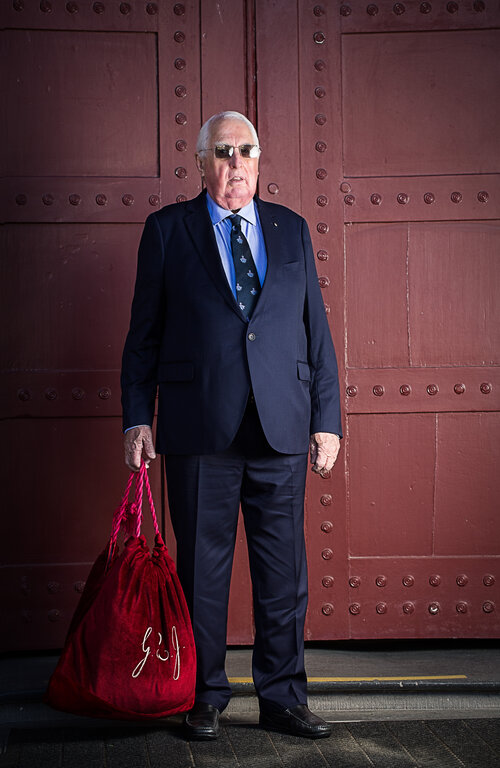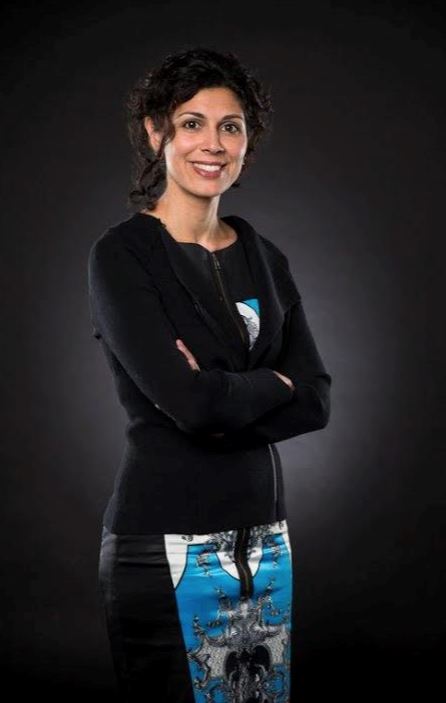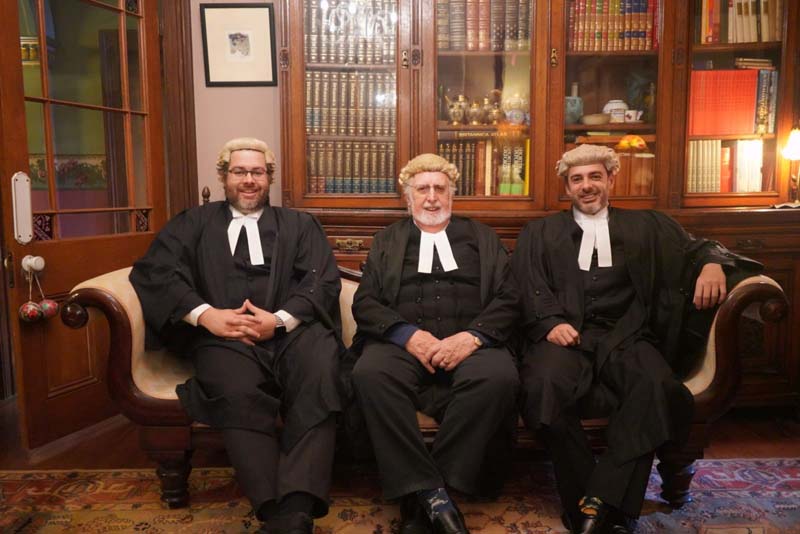Greg James AM QC

I’m having a chat with Greg James AM QC in an hour to gather material for this feature piece in Bar News. The juggle of home-schooling and working from home has left me little time to research my subject. I feel ill-prepared. Where does one turn in situations like this? Wikipedia of course!
Greg would go on to tell me that his Wikipedia entry was accurate in all but one respect. It described him as being the youngest appointed QC in New South Wales which, apparently, he was not. Appointed at the age of 38, you could have fooled me…
Talking to Greg about his career journey is like reading a ‘hard to put down’ biography. His story is abundant with fascinating cases and appointments across an array of subject areas in the law. It is impossible to recount our one-hour chat in only a couple of written pages.

I am most keen to talk to him about prosecuting Ivan Polyukhovich, Australia’s first prosecution of an alleged Nazi criminal under the 1988 amended War Crimes Act that allowed prosecutions against suspected European criminals in ordinary criminal courts in Australia. But before getting to that, there are some other things we need to know and understand about Greg. His is a story of how fate put him on a trajectory he never saw coming and a career marked by legal cases that would go on to change legislation and bring about significant reforms in New South Wales, in areas including gun laws, prison systems and mental health, just to name a few.
He tells me a tale of the unremarkable life of a boy who grew up in Roseville Chase and who, to use his words, was 'not particularly good at anything' except for debating (no surprises there).
He went on to study Arts/Law at the University of Sydney on a Commonwealth scholarship and worked part-time with the public service. I’m intrigued to hear that he worked with the 'Master in Lunacy', a court officer appointed to control the money and property of persons found mentally unfit. Little did Greg know at the time that the experience he gained there would serve him well decades later in his role as President of the Mental Health Review Tribunal of New South Wales.
He moved over to the Public Solicitor’s office doing tenancy work. He is proud to say that he was able to extensively brief the junior bar, keeping many going at 10 Guineas (~$21) a case and a second-class train ticket to get out to the courts. It was here at the public solicitor’s office that he owes his skills in statutory interpretation. His ‘bread and butter’ so to speak, was interpreting the Landlord and Tenant (Amendment) Act 1948.
In time he was head hunted to Freehills, working on some major building development deals in Sydney, including the MLC building. He worked with the likes of John Dumford QC, Bob Hope QC and Neil Mackerras. For all intents and purposes Greg was a talented civil lawyer and coming to the Bar in 1972 it was a natural progression for him to establish himself in civil practice.
As fate would have it, Greg was involved in a major accident, necessitating a serious shoulder repair operation. He had to hand over his equity practice while he recovered. Almost six months after the accident he was inflicted with ‘raging hepatitis’ from the blood transfusion he had earlier been given during the operation. He recalls keeling over in court during a family provision case and being rushed off to hospital from the courtroom. Greg stops to reflect here, 'importantly I was insured through the Bar schemes and sensible enough to take that up, otherwise I would have been bankrupt. Chambers was very kind to me regarding my chambers obligations.'
When he recovered, he had nothing to do; no practice to return to. But a helping hand changed all that. Jeffrey Miles, the former Chief Justice of the ACT managed to get Greg into a committal as a junior to Jim Staples. The committal related to the Bathurst gaol riots. The riots were over poor conditions and mistreatment of inmates. The case was the catalyst for a Royal Commission into the prison system. It was also Greg’s introduction to the criminal law.
What followed was the best part of a decade doing criminal appeals involving questions of law. Fuelled by briefs from the Legal Aid Commission and Aboriginal Legal Service, Greg was getting a high volume of briefs in the Local Court through to the High Court. In the High Court 'you get little time to impress fabulously gifted minds. It is a great arena to learn advocacy', he tells me.
He famously went on to become lead counsel for various Bandidos in the Milperra Massacre or otherwise known as the Milperra bikie shootout on Father’s Day in 1984. It was one of the largest single trials in Australian history. Greg defended over 20 accused with the help of five junior counsel and that was a small legal team compared to some others. The trial took 14 months. That event was also a catalyst for significant changes to gun laws in New South Wales.
In 1988 he became an associate judge of the District Court of New South Wales. However, a career changing brief and a subsequent Supreme Court appointment meant that he served only one day as an associate judge of the District Court.
The career changing brief was to advise and prosecute charges against Ivan Polyukhovich for offences committed in 1942 including the murder of 850 Jews, in Serniki Ukraine. It was a brief that Greg says he could not say no to even though the fees were not at a commercial level. When he was offered the brief he was told it would take a year; it took five.
Polyukhovich immigrated to Adelaide in 1949 and became an Australian citizen in 1958. He was charged for his alleged involvement in a pit killing in the village of Serniki of the 850 Jews and was also accused of escorting three people to the pit and shooting them personally.
Greg advised early that it was important to locate the remains of the dead and derive as much forensic assistance as possible in addition to eyewitness testimony. A team of investigators travelled to Ukraine to excavate the mass grave. Bodies were exhumed in June and July 1990. Greg had to travel to the Ukraine on a view and to take witness statements. What Greg did not appreciate was the extent to which forensic examination would go on to identify a number of the deceased with the use of school photos, among other forensic tools. Bullets were also uncovered as were the diaries of executioners. The witness statements were taken on Toshiba laptops. This may have been the first time in criminal proceedings that this technique was used. A large number of witnesses from all over the world had to travel to Adelaide for the proceedings. This was one of the first occasions in which so many witnesses had to be specially catered for under a protection program.
The case was, however, marred by a number of challenges. The day before his committal hearing on 29 July 1990, Polyukhovich shot himself. It looked like all that extraordinary forensic and ballistic work would be in vain. However, the gunshot proved not fatal and Polyukhovich survived to see through his trial.
The next hurdle came in the form of a constitutional challenge. On 3 September 1990 the High Court began hearing a challenge to the constitutional validity of the War Crimes Amendment Act. On 14 August 1991 the war crimes legislation was endorsed by the High Court, ruling that:
'Australia’s international personality would be incomplete if it were unable to exercise a jurisdiction to try and to punish offenders against the law of nations whose crimes are such that their subjection to universal jurisdiction is conducive to international peace and order.'1
On 18 May 1993, the jury acquitted Polyukhovich. Greg tells me that the case 'boiled down to whether the surviving witnesses who had made an identification of Polyukhovich at the time the killings occurred were accurate enough for the jury to rely on.' Unfortunately, the identification evidence was not reliable enough to secure a guilty verdict. Some of the witnesses died before they could give evidence and some of the witnesses were not well enough to come to Australia. The passage of time had worked its spell against the prosecution.
Greg remembers the years prosecuting Polyukhovich as 'very busy'. He was also acting for the Deputy Premier of Western Australian in the WA Inc Royal Commission and consequent criminal proceedings. He recalls rushed trips to the airport with his wife driving. He had two young sons at the time and laments that he didn’t see as much of them as he should have. As it so happens both of Greg’s sons, Evan and Liam, are now barristers at the NSW Bar.
Greg was appointed to the Supreme Court in 1998 where he served over seven years. What is most remarkable about this period of his life is that he served as a judge while he suffered from an eye condition that led to 15 operations. Both his eyes were eventually reconstructed. Unfortunately, his eyes started failing him again and this ultimately led to his retirement from the bench and the termination of his lengthy association with Southern Cross University.

After such an illustrious career, including appearing in various Royal Commissions, Commissions of Inquiry, ICAC, serving as the Royal Commissioner on the Kapunda Road Royal Commission, a Commissioner on the New South Wales Law Reform Commission, an Adjunct Professor at Southern Cross University and as a contributor to judicial education in the Solomon Islands, one would think it was an appropriate time for Greg to retire from the profession. But he did not. In 2012 he returned to the Bar. 'Why?', I ask. 'To work in court with my sons', he swiftly replies. That seems like as good a reason as any. To this day he continues to take briefs from Legal Aid and the Aboriginal Legal Service.
In 2012 Greg was appointed as a Member of the General Division of the Order of Australia (AM) for services to judicial education, mental health law reform, international relations and administration of criminal justice. In the same year he was awarded a Doctorate of Laws (Honorius Causa) from Southern Cross University.
'What’s this about you being the 'Surfing QC?', I ask, referring to a news article my googling has uncovered. The answer is best left for another time…
ENDNOTES
1 Polyukhovich v The Commonwealth of Australia (1991) 172 CLR 501.